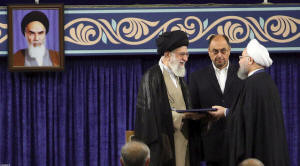|
Rouhani gets Iranian supreme leader's nod
as second-term president, faces risks
 Send a link to a friend
Send a link to a friend
 [August 03, 2017]
By Parisa Hafezi [August 03, 2017]
By Parisa Hafezi
ANKARA (Reuters) - Hassan Rouhani won the
endorsement of Iran's supreme leader for his second term of president on
Thursday after an easy election win, pledging to open Iran to foreign
trade and investment but facing internal hardline resistance and renewed
U.S. antagonism.
Under Rouhani's watch, Iran emerged from international isolation in 2015
when it struck a deal with six world powers to curb its disputed nuclear
program in exchange for the lifting of financial and economic sanctions
in place for a decade.
But his quest to parlay fragile detente with the West into financial
infusions to rebuild Iran's oil-based economy has been slowed by
investors' fears of pre-existing U.S. sanctions and suspicions among
powerful hardline acolytes of Supreme Leader Ayatollah Ali Khamenei of
any rise in Western influence.
The new U.S. sanctions could embolden Rouhani's conservative rivals who
say the nuclear deal was a form of capitulation.

An elite insider who has held senior political and military posts since
the 1979 Islamic Revolution, Rouhani comes off as a pragmatist unlike
Khamenei and his allies, and analysts have cast doubt on his ability to
balance their demands and the expectations of his often young and more
liberal supporters.
Khamenei, who has the last word on all major issues of state, formally
endorsed Rouhani as president in a ceremony broadcast live on state
television on Thursday, after the pragmatist romped to re-election on
May 19.
Addressing religious, military and political leaders, Khamenei prayed
for "the success of a worthy person".
Handing the presidential mandate to Rouhani, Khamenei kissed him on the
cheek and the president kissed the Supreme Leader on his shoulder, a
sign of supplication.
Khamenei again called for economic self-sufficiency and a "resistance
economy", a stance arising from his repeated criticism of the halting
pace of economic recovery since most international sanctions on Iran
were lifted early last year.
Rouhani will be sworn in on Saturday and then have two weeks to present
his cabinet to parliament for a vote of confidence.
AIMS TO IMPROVE IRAN'S IMAGE ABROAD
"The government's aim is to improve Iran's image in the world ..., to
safeguard people's rights..., to end poverty..., to protect the
religious democracy and our people's votes," Rouhani said in a speech at
the ceremony.
[to top of second column] |

Iran's President Hassan Rouhani receives the presidential mandate
from Iran's Supreme Leader Ayatollah Ali Khamenei during an
endorsement ceremony, in Tehran, Iran August 3, 2017.
President.ir/Handout via REUTERS

Analysts said Rouhani may struggle to make a significant impact
given sharpening divisions in the dual clerical-republican power
structure, and Washington's return to an aggressive Iran policy
since Donald Trump took office.
"Hardliners will try even harder than in Rouhani's first term to
make him look like a lame duck president ... It will be very
difficult for Rouhani to deliver on the economy," said Meir
Javdanfar, an Iranian-born expert on the Islamic Republic at the
Interdisciplinary Center Herzliya in Israel.
Rouhani's own supporters have expressed concern over his inability
to include women as ministers in his new cabinet because of pressure
from religious hardliners.
Javdanfar said the new U.S. sanctions on Iran signed by Trump into
law on Wednesday, along with measures against Russia and North Korea
would likely deter foreign investors and so undermine Rouhani's
efforts to boost the economy.
Rouhani stuck to an upbeat outlook in his speech. "The nuclear deal
is a sign of Iran's goodwill on the international stage...Iran will
never be isolated," he said.
During his 2016 election campaign, Trump blasted the nuclear
agreement - negotiated under his predecessor Barack Obama - as "the
worst deal ever" but not followed through on threats to pull the
United States out of it.
But Iran's deputy foreign minister said the fresh sanctions violated
provisions of the nuclear deal and vowed an "appropriate and
proportional" response.

"Imposing new sanctions on Iran by America is a reactionary,
illegitimate and irrational move," state television quoted Foreign
Ministry spokesman Bahram Qassemi as saying on Thursday.
(Reporting by Parisa Hafezi; Editing by Mark Heinrich)
[© 2017 Thomson Reuters. All rights
reserved.]
Copyright 2017 Reuters. All rights reserved. This material may not be published,
broadcast, rewritten or redistributed. |